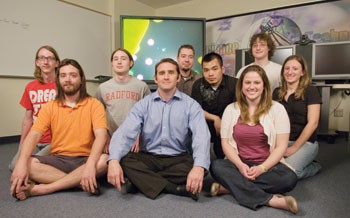Seed Grant Finances a Research Powerhouse
Matt Dunleavy came to Radford University in 2007 from a post-doctoral fellowship at Harvard University. Immediately upon arriving, he was able to secure a $20,000 seed grant from the Office of Sponsored Programs and Grants Management to develop mobile technology applications and curricula for elementary, middle and high school students. Since then, Dunleavy and his GAMeS Lab team in the College of Education and Human Development have transformed that grant into a $2.2 million research and development program.

Matt Dunleavy (center) and his colleagues in the GAMeS Lab are using technology to improve the way people learn.
“Right now, someone somewhere in a lab is working on something that will be released soon that will totally change the game,” Dunleavy said, citing “disruptive technologies” — a term for innovations that disrupt an existing market. “The iPad and iPhone are good examples. They are game-changers that completely altered the landscape of multiple industries, and the GAMeS Lab is figuring out how to use them in the classroom to improve education and what they mean for students’ teaching and learning.”
To develop and rate the success of iPad and iPod touch games in the classroom, Dunleavy won a $1.6 million grant from the Virginia Department of Education. That project is being done in collaboration with teachers and administrators in the Pulaski County and city of Radford public school systems and New River Community College. Dunleavy and his colleagues in the RU GAMeS Lab also won a prestigious $500,000 grant from the National Science Foundation to develop augmented reality games.
Augmented reality (AR) uses handheld computers and GPS receivers to create simulations or games that are played in a real physical space, such as a school playground. In a typical app, students walk around the school grounds while a map on their handheld devices shows virtual objects and characters superimposed on the real space. When a student comes within 30 feet of a digital object, AR and GPS software trigger video, audio and text files that pose problems while giving clues for solving them.
The GAMeS Lab’s groundbreaking work in augmented reality is drawing national attention. The 2011 edition of the New Media Consortium’s Horizon Report, which examines the impact and use of emerging technologies in teaching and learning, recognized the GAMeS Lab’s ROAR (Radford Outdoor Alternative Reality) project as a leader in the field.
When Dunleavy and two of his programmers, Daniel Burgess and David Payne, could not find suitable software they could use to develop their AR learning games, they wrote their own. Called “FreshAiR,” the new software can be used by teachers and students who want to create their own AR games or projects. Plans are underway to market FreshAiR through a start-up company, Mogo Mobile, created in collaboration with the RU Foundation. It is the university’s first patented intellectual property.
“What Matt has done with his research is textbook technology transfer,” said Dennis Grady, dean of the College of Graduate and Professional Studies, which includes the Office of Sponsored Programs and Grants Management. “First you have an idea, then you write an exploratory grant to flesh out the idea, then you write state and federal grants to prove the concept, then you file a patent to protect the idea and perhaps commercialize it. We hope to have several more faculty follow in his footsteps as they see the value of doing sponsored research.”
“To me that is a big story,” Dunleavy said. “With a National Science Foundation grant, the GAMeS lab invented its own software that has commercial viability and that can be taken out into the marketplace. That will result in entrepreneurship and jobs being created in this area.”